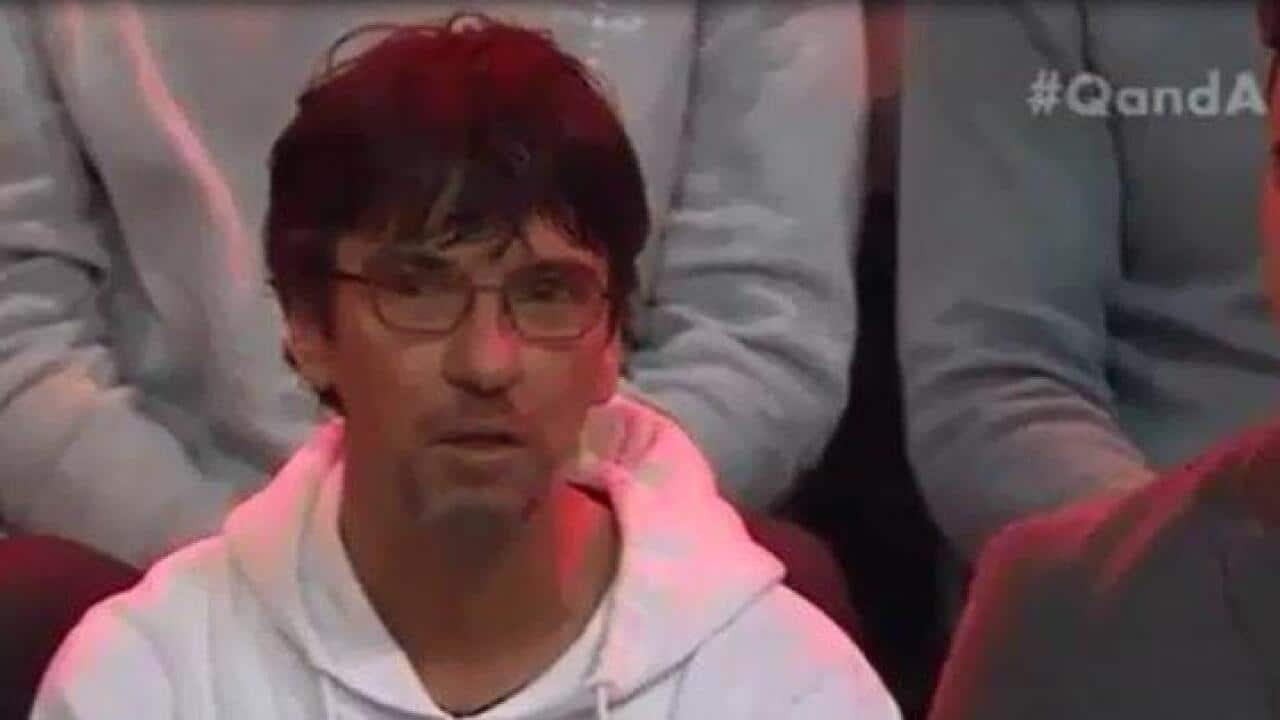We know the story – he asked a question on ABC’s Q&A about the necessity of tax cuts for the rich when a cut for the poor would have a more positive and immediate impact on low-income earners. He’s received a wide reaction since: from a Go Fund Me created by a stranger that raised sixty thousand bucks and counting to having his past misdeeds detailed on the front page of the Herald Sun.
Socio-economic fairness in budgets, low-income versus high-income earners, and six-grand toasters aside, what does the reaction to Storrar’s story tell us about the current climate in the media?
"is it a prerequisite of speaking out that one must have an un-besmirched record?"
He’s been called a battler and a bludger, a deadbeat dad and had his former relationships detailed in the press. He’s been accused of past drug use and had his disability called into question. What does this matter? In the 24-hour news cycle, is it a prerequisite of speaking out that one must have an un-besmirched record? If someone has made a misstep in life, or been a shitty parent, or smoked a jay or two or fifty in their past, does that mean they are not entitled to speak out or to ask for better? Without the power of a privileged position to post from, are all the disadvantaged of Australia reduced to silence with the threat of their dirty laundry slammed on to the front page of the Herald Sun? This digging up the past has failed to get to the bare bones of his point. He wasn’t asking for a Go Fund Me, a new toaster, or to have his personal life called into question. He asked a question to draw attention to the vast imbalances in economic policy. A question that thousands of low-income earners around the country are asking too: it’s just that Duncan managed to get a seat at the Q&A taping, and they did not. It’s a significant and pertinent issue, so somebody was bound to bring it up eventually.
This digging up the past has failed to get to the bare bones of his point. He wasn’t asking for a Go Fund Me, a new toaster, or to have his personal life called into question. He asked a question to draw attention to the vast imbalances in economic policy. A question that thousands of low-income earners around the country are asking too: it’s just that Duncan managed to get a seat at the Q&A taping, and they did not. It’s a significant and pertinent issue, so somebody was bound to bring it up eventually.

Duncan Storrar on the front page of The Herald Sun Source: NewsCorp
"Can we afford to silence everyone who might have made a mistake in the past?"
The media’s reaction may make others hesitant to do the same. By publically, nationally, shaming and attempting to discredit Duncan Storrar, it sent a clear message to anyone from a disadvantaged group who might be tempted to pipe up in the future: unless your nose is squeaky clean, keep your mouth shut.
Can we afford to silence everyone who might have made a mistake in the past? People who’ve erred still have a right to speak in public forums, and a right to question the government and a right to hold their head high. So what if he might have used cannabis in the past? So have 34.8% of Aussies over the age of 14. Don’t even get me started on the whole connection between escapist drug-use and poverty, because I don’t have all day and an unlimited word-count.
Disadvantaged groups (the mentally ill, the drug addicted, the disabled, those in poverty, as well as indigenous Australians) are notoriously over-represented in prison populations, and regardless of their transgressions, they deserve to speak. What is prison for, if not the chance of rehabilitation? These voices are already lacking in the media, and a trouncing in the papers is a huge disincentive to people from these groups to add their bit to the political debate.
"Disadvantaged groups need more of a voice in the media, not less"
When massive media conglomerates with money and reach and big, inky headlines take on a dude making a couple hundy a week, it’s a reflection of the inequality that Mr Storrar was trying to highlight. A thorough raking-over in the media is a deterrent to anyone who might have something to say, and these are the people who need to be heard. Disadvantaged groups need more of a voice in the media, not less, and to add their voices the threat of exposure is one way to ensure that we keep those without the strongest voices silenced. The threat of complete personal annihilation via the media becomes another way to further disadvantage those who are already disadvantaged.
Marlee Jane Ward is a writer from Melbourne, Australia. You can find her short fiction . Her debut novella, Welcome To Orphancorp, won the 2016 Victorian Premiers Literary Award for Young Adult Fiction.


